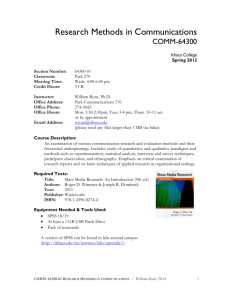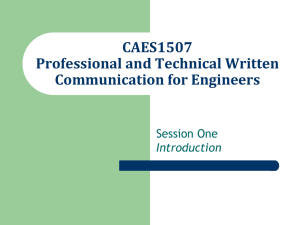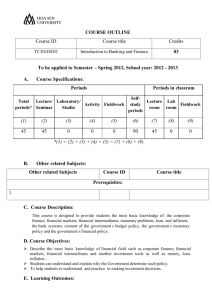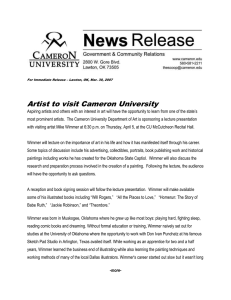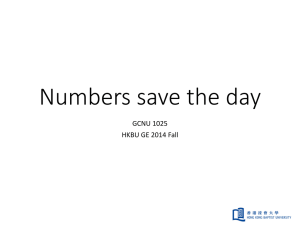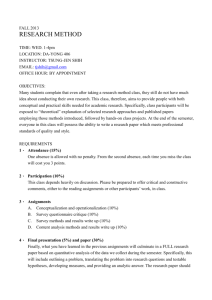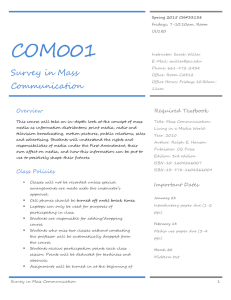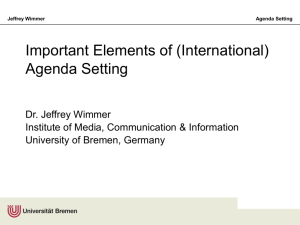INTRODUCTION TO CONTEMPORARY CIVILIZATION,
advertisement
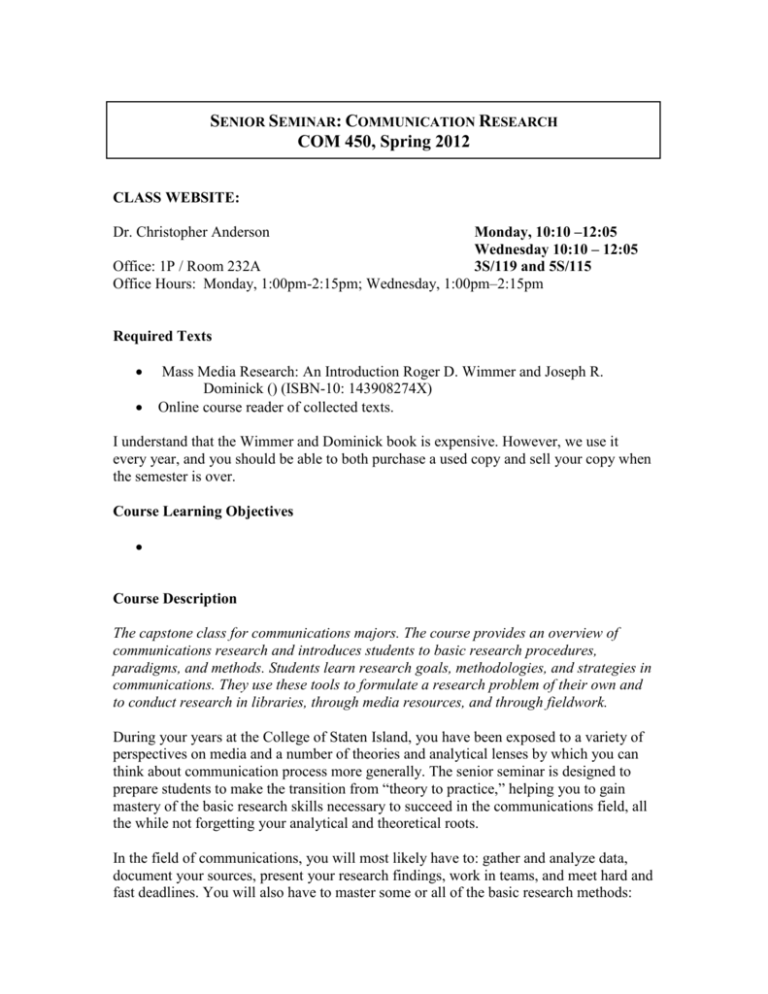
SENIOR SEMINAR: COMMUNICATION RESEARCH COM 450, Spring 2012 CLASS WEBSITE: Monday, 10:10 –12:05 Wednesday 10:10 – 12:05 Office: 1P / Room 232A 3S/119 and 5S/115 Office Hours: Monday, 1:00pm-2:15pm; Wednesday, 1:00pm–2:15pm Dr. Christopher Anderson Required Texts Mass Media Research: An Introduction Roger D. Wimmer and Joseph R. Dominick () (ISBN-10: 143908274X) Online course reader of collected texts. I understand that the Wimmer and Dominick book is expensive. However, we use it every year, and you should be able to both purchase a used copy and sell your copy when the semester is over. Course Learning Objectives Course Description The capstone class for communications majors. The course provides an overview of communications research and introduces students to basic research procedures, paradigms, and methods. Students learn research goals, methodologies, and strategies in communications. They use these tools to formulate a research problem of their own and to conduct research in libraries, through media resources, and through fieldwork. During your years at the College of Staten Island, you have been exposed to a variety of perspectives on media and a number of theories and analytical lenses by which you can think about communication process more generally. The senior seminar is designed to prepare students to make the transition from “theory to practice,” helping you to gain mastery of the basic research skills necessary to succeed in the communications field, all the while not forgetting your analytical and theoretical roots. In the field of communications, you will most likely have to: gather and analyze data, document your sources, present your research findings, work in teams, and meet hard and fast deadlines. You will also have to master some or all of the basic research methods: literature reviews, variable analysis, surveys, content analysis, participant observation, ethnography, focus groups, discourse analysis, and the analysis of “big data.” This class will teach you to master these methods and practices. It will do so by asking students to develop and carry out their own group research projects focusing on a particular trend or phenomenon in communication (for example, students in previous classes discussed the rise of the iPod and the growth of Facebook). This class is an intensive capstone class, and thus involves a significant amount of group work both inside and outside of class, as well as self-directed research. Course Requirements This is the grading breakdown for the course. To receive a passing grade for the class, students must meet all requirements. Missed assignments will automatically result in a failing grade. Groups Assignments / Portfolio ............................................……… 30% Midterm …………………............................................................... 25% In-class Presentation …………………………………………… 15% Final Paper ………………………………………………….. 20% Class Participation ………………………...……………………... 10% Group Assignments Include 1. Proposal (Due) 2. Literature review (Due) 3. Sampling exercise (Due) 4. Midterm assessment (Due) 5. Coding sheet and instructions (Due) 6. Content analysis (Due) 7. Survey report (Due) 8. Final presentation (Due) Individual Assignments Include 1. Midterm (in-class) 2. Final (paper) Basic Breakdown of the Week This class will meet Mondays and Wednesdays. In general, Mondays will consist of lectures and in-class discussion, while Wednesdays will consist of group work and making progress on your final project. It is important to keep in mind, however, that most of your group work will need to be done outside of class. How the Group Projects Will Work Most communication research- indeed, most research, and most work generally- requires you to work in teams, and this class is designed with that expectation in mind. You will have [6?] group projects due over the course of the semester, projects which will build on each other and culminate in your final in-class presentation (due the last week of class). For all group projects you will need to work as a team and divide work evenly. For each of the six projects you will have a different project manager, who accepts responsibility for scheduling meetings, dividing up the work, and meeting deadlines. The project manager will submit a 1-page memo to me, along with the actual assignment itself, in which he or she chronicles the different meetings of the group, problems with roadblocks encountered in completing the assignment, and a general analysis. The groups will begin by picking a research topic. Over the course of the semester, they will complete their assignments. These assignments will culminate in a 30-minute group presentation, due the last day of class. I will provide you with examples of each assignment. The literature review will need to include an annotated bibliography of at least twelve sources. Survey reports and content analysis reports should be professionally presented and include graphs and figures, as well as a two-page narrative summarizing your findings. Field notes should include a “self-reflection” section wherein you discuss your fieldwork. Project manager memos will be addressed to me and take the form of an inter-office memo. It should be at least one full page. You will chronicle the different meetings of the group, problems with roadblocks encountered in completing the assignment, and engage in a general analysis. This is not a chance for you to badmouth your fellow students. Mid-Term Students will complete a traditional mid-term exam, in class, on [xxxxx]. Final For the final, each student will write a five-page paper that will serve as a self-reflection on the semester as a whole. This paper will be due, in my mailbox, on the day reserved for you to take your final exam (there will be no in-class final exam) (you cannot email me your final paper). Your final paper is a chance to comment on the findings of the group and, most importantly, offer suggestions for future research. How would you improve the research if you had more time to engage in a fuller ethnographic, focus group, and interview research. How would you evaluate your research methods and findings? The final paper should be at least five pages. Attendance Students are expected to attend every session of the senior seminar. According to college policy, unexcused absences exceeding 15% of course hours can result in a WU grade. Bottom line: don’t miss class. In the event that a student must miss a class due to religious observance or family emergency, students must provide advance notice, in writing, of days missed. In the event of class missed due to illness, students must provide the instructor with a doctors’ note. No exceptions. Plagiarism Plagiarism is a major—perhaps the major—academic offense a student can commit as an undergraduate, graduate student, or as a scholar. Plagiarism is defined as either (1) failure to acknowledge the source of ideas not one’s own or (2) failure to indicate verbatim expressions not one’s own through quotation marks and footnotes. Plagiarism is a growing problem on college campuses across the nation, largely due to growing technological ease in accessing already composed papers and sources of information. For this reason, I personally will be relentlessly unforgiving regarding any suspected cases of plagiarism this semester—and I will check. There will probably not be a second chance in this regard, and I will recommend the strict enforce university policy for all cases of plagiarism. Bottom line: don’t do it. If you have any questions, please talk to me before you write rather than afterward. For more information, see the CUNY Policy on Academic Integrity: http://www1.cuny.edu/academics/info-central/policies.html. For a guide on how to cite your sources well, see http://www.library.csi.cuny.edu/?option=com_content&view=article&id=130 Ironically, we will be discussing and critiquing elements of plagiarism during one of the sessions of this class. Schedule of Classes January 30 Class Introduction and Student Group Formation February 1 READING DUE: “The Scientific Revolution,” (excerpt) (Shapin) LECTURE: What is science? Where did science come from? February 6 READING DUE: “Science and Research,” (Wimmer and Dominick, Ch. 1) LECTURE: What is communication research? February 8 READING DUE: “Technology and Modern Life,” (Shannon) LECTURE: The literature review: what do we already know? ASSIGNMENT DUE: Group project proposals (Assignment #1) February 15 LECTURE: Bibliography, Citations, and Links GROUP WORK: Building a bibliography *** NOTE: No Monday class this week *** February 21 READING DUE: “A History of Statistics in the Social Sciences,” (Coven); “The Wisdom of Crowds” (excerpts) (Surowecki) LECTURE: Variables, validity, and reliability February 22 GROUP WORK: Library trip and further work on literature review *** NOTE: MONDAY CLASS THIS WEEK IS ON A TUESDAY*** February 27 READING DUE: “Sampling,” and “Research in the Electronic Media” (Wimmer and Dominick, Ch. 4 and 14) Lecture: A brief history of sampling and early audience research. February 29 GROUP WORK: Sampling exercise ASSIGNMENT DUE: Literature review (Assignment #2) March 5 READING DUE: “Content Analysis” (Wimmer and Dominick, Ch 6); “The Whole World is Watching” (excerpt) (Todd Gitlin) LECTURE: Content Analysis March 7 ASSIGNMENT DUE: Sampling exercise (Assignment #3) GROUP WORK: Content Analysis: Identifying a corpus (Library) March 12 GROUP WORK: Midterm research assessment. ASSIGNMENT DUE: Midterm Research Assessment (Assignment # 4) March 14 *** MIDTERM (IN-CLASS) *** March 19 READING DUE: “Survey Research,” (Wimmer and Dominick, Ch. 7); “Survey Research and Societal Change,” (Tourangeau). March 21 GROUP WORK: Content analysis: coding Sheet and instruction form. March 26: READING DUE: “Interview Techniques,” (Wimmer and Dominick, Ch. 5) LECTURE: Interview techniques March 28 GROUP WORK: Content analysis: coding ASSIGNMENT DUE: Coding sheet / Instruction sheet for content analysis. April 2 READING DUE: “Focus Groups as Qualitative Research,” (Morgan) LECTURE: Focus Groups April 4 ASSIGNMENT DUE: Content analysis report. SCREENING: “Kinsey.” April 16 READING DUE: “,” (Wimmer and Dominick. TK) “Appendix: On the Methods Used in this Study” (Gans) LECTURE: Ethnography and Participant Observation April 18 IN-CLASS DEBATE: Ethnography vs Surveys April 23 READING DUE: “The Interaction Order,” (Goffman) LECTURE: Narrative and textual analysis April 25 GROUP WORK: Preparing a survey April 30 READING DUE: “Six Provocations for Big Data,” (boyd and Crawford) LECTURE: Big data May 2 [trip to high speed computational center?] May 7 LECTURE: Research ethics SCREENING: Stanford Prison Experiment Assignment Due: Survey Report and supporting documents May 9 *** FINAL PROJECT PRESENTATIONS, PART I *** May 14 *** FINAL PROJECT PRESENTATIONS, PART I *** *** FINAL PAPER DUE: MAY 21 ***
